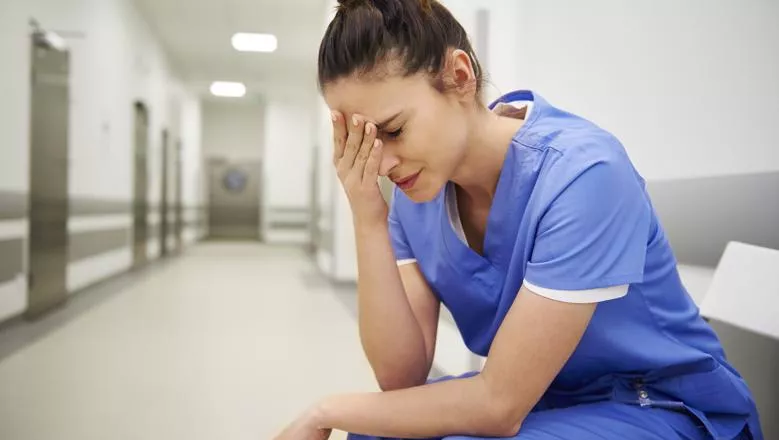It’s an incredible privilege to interview nursing and care home staff about their experiences of working during COVID-19. To hear them talk about how they’ve delivered care to patients and relatives in such challenging circumstances, and how they have supported and been supported by their peers has been amazing. But it’s also been heart-breaking to hear of their fears about safety for themselves and their families, dealing with so many patients dying and feeling abandoned by managers. This and other projects in the ICON study are a way for us to support nurses during the pandemic by helping make their experiences visible to as many people as possible.
Ruth Harris, Professor of Health Care for Older Adults, Faculty of Nursing, Midwifery & Palliative Care
03 December 2021
Funding to extend research into impact of COVID-19 on nurse and midwife wellbeing
The Colt Foundation funding extends previous work examining the impact of COVID-19 on the mental health of nurses, midwives, and other health care assistants.

A team of experts including researchers from King’s College London, have received additional funding to extend their previous work examining the impact of COVID-19 on the mental health of nurses, midwives and other health care assistants.
The Colt Foundation has awarded nearly £60,000 to enable further interviews to be conducted as part of the ICON (Impact of COVID on Nurses) interview study so that the ongoing impact of the pandemic on nurses can be evaluated and mitigations identified. The funding has been awarded to the University of Surrey and the project involves researchers from the Florence Nightingale Faculty of Nursing, Midwifery & Palliative Care at King’s, Cardiff University, the University of Plymouth, and the University of Warwick.
The ICON interview study, initially funded by the Burdett Trust and Florence Nightingale Foundation, began in 2020 with a first round of in-depth interviews with 27 nurses after the first wave of COVID-19 in July 2020 which were repeated in December 2020. Health care assistants, registered nurses, registered midwives, and those re-deployed to COVID areas spoke about their experiences of working through the pandemic, often revealing emotional distress like anxiety, frustration, guilt and inner turmoil. High levels of burnout and Post Traumatic Stress Disorder (PTSD) were reported, both of which affect nurses’ experiences at work and influence their ability to provide compassionate care.
The findings from the interviews have been shared extensively online, in academic papers and at conferences, including at the Royal College of Nursing annual conference in September 2021. They also fed into the Parliamentary Select Committee hearing on nurses’ wellbeing, which published its report in June 2021 and into commentary on the nurse pay offer.
Now, because the pandemic is not yet over, the research team wants to extend the length of the study and interview the same nurses twice more to identify how the changing characteristics of the pandemic are altering staff wellbeing over time and what support and interventions are helping. They are also inviting more professionals to be interviewed to ensure the experiences of other groups not in the original sample have an opportunity to share their experiences of working through the pandemic. These include care home staff, children’s nurses, more minority ethnic nurses and student nurses. The funding from the Colt Foundation will enable the team to conduct these extra interviews and examine the results.
Jill Maben, Professor of Health Services Research and Nursing in the School of Health Sciences at the University of Surrey, said:
'Nurses, midwives and people in other healthcare assistant roles were already at high risk of stress and burnout even before COVID-19. During the pandemic, unprecedented demands and unfamiliar working conditions coupled with high concern for their own or their family’s health and the stress of trying to provide high quality care for patients in the face of an unknown deadly disease has resulted in a workforce under extreme pressure with high levels of poor mental health. As we go into the second COVID winter, nurses are still feeling overstretched but now often feel neglected and betrayed as well, thanks to what they see as inadequate pay rises and the price of being on the frontline. Their health has been affected and they feel they are now bearing the brunt of people’s frustrations waiting for strained NHS services. Our research will continue to document their experiences and identify more ways to help these essential workers.'
The ICON interview study is part of a broader programme of research exploring the impact of COVID-19 on the UK nursing and midwifery workforce which began in April 2020. This included longitudinal surveys at different timepoints during the pandemic. Organisations involved include the Royal College of Nursing Research Society steering group, King’s College London, University of Warwick, Cardiff University, University of Plymouth, University of Nottingham, University of Surrey, and St Bartholomew’s Hospital. The project team includes Professor Ruth Harris and Dr Emma Rowland from King’s College London.; Professor Jill Maben from the University of Surrey, Professor Danny Kelly from Cardiff University, Professor Bridie Kent from the University of Plymouth, Assistant Professor Keith Couper from the University of Warwick.

